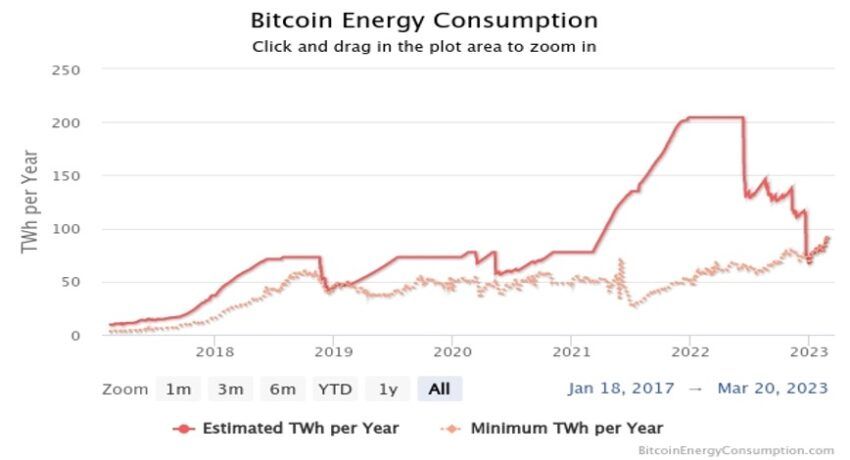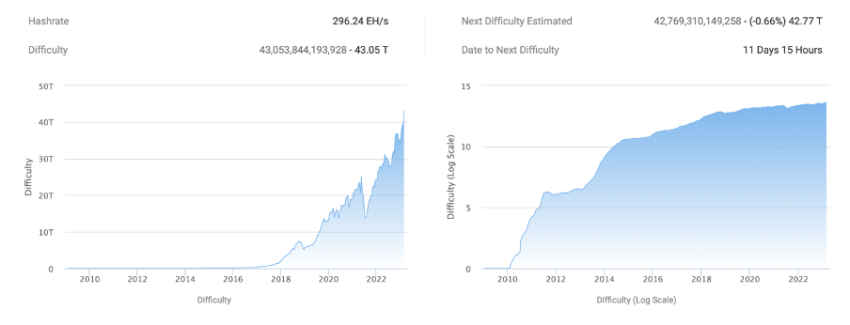Crypto and Bitcoin mining operations continue to lock horns with US Congress over their energy consumption. Different reports in the US have raised environmental concerns. Now miners are changing their approach by taking the sustainability route.
The much-talked migration of crypto miners from China to the US has increased energy consumption demands in regions of the US. Now, American regulators have echoed concerns over the intense energy consumption spree.
Mining cryptos such as Bitcoin is an energy-intensive process. It requires specialized computers to solve complex mathematical problems to verify transactions on the blockchain. These computers consume significant electricity. The process is highly competitive, as miners race to solve the problem first and earn a reward in Bitcoin.
Mining Operations in the US
Some states with low energy costs and favorable regulations, such as Texas and Wyoming, are popular destinations for crypto miners. As more miners establish operations in these states a noticeable increase in energy consumption is putting pressure on local power grids.
For example, in Texas, the Electric Reliability Council of Texas (ERCOT) raised concerns about the strain on the state’s power grid due to the influx of crypto miners. According to ERCOT, Bitcoin mining could consume up to 3% of the state’s electricity supply by the end of 2021.
Similarly, in Wyoming, some communities have reported significant increases in energy consumption due to crypto-mining operations. The increased demand for electricity has led to concerns about power outages and grid reliability.
Regulators Are Cracking Down on Mining Operations
Crypto mining and miners have faced criticism for their high energy usage. Some estimates suggest the industry uses as much energy as entire countries. Cryptocurrency mining requires significant computing power, which in turn, requires substantial energy consumption. The energy consumption needed for cryptocurrency mining has concerned environmentalists and policymakers.
A Whitehouse 2022 report was among the first publicly available responses to U.S. President Joe Biden’s executive order on cryptocurrencies. The office detailed its approach to the question of what sort of impact crypto mining has on the environment. Details in the Whitehouse report include the scale of the impact and how different cryptocurrencies require different energy needs.
Crypto mining, particularly bitcoin (BTC), uses significant electricity, undermining U.S. sustainability goals.

“Global electricity generation for the crypto assets with the largest market capitalizations resulted in a combined 140 ± 30 million metric tons of carbon dioxide per year (Mt CO2/y), or about 0.30% of global annual GHG emissions,” the report said.
How Does Mining Operation Affect the US
Further, the study uses another comparison wherein the crypto industry’s operations use as much electricity as the nation’s home computers combined.
Last year, Senator Elizabeth Warren and a group of Democrats urged the Environmental Protection Agency and the Department of Energy to take action against cryptocurrency mining. They cited the high levels of energy consumption required for mining as “disturbing” and highlighted the potential environmental impact of the industry.

Herein, Congress called out gigawatt-scale energy usage by crypto miners, questioning the sustainability and environmental impact of the industry. Of late, Massachusetts Senator Elizabeth Warren asked for greater transparency from cryptocurrency miners due to concerns over the environmental impact of Bitcoin, the bellwether cryptocurrency.
Senator Warren urged the Environmental Protection Agency (EPA) and the Department of Energy (DOE) to use their authority to require that crypto miners disclose their energy use and emissions.

Miners are Taking Charge, Making Changes
In response, many crypto miners have defended their energy usage, pointing out that most energy comes from renewable sources. They argue that because the energy consumption of crypto mining is not constant, it can help balance the grid and use excess energy that would otherwise go to waste.
Additionally, some crypto miners have pointed out that the industry is constantly working to improve energy efficiency, with new mining hardware being developed that requires less energy to operate. They argue this is necessary to ensure the industry’s long-term sustainability.
BeInCrypto reported on Feb. 21 that mining Bitcoin accounted for more than 50% of sustainable energy sources. Bitcoin has grown its sustainable energy mix to 6.20% annually since Jan. 2020. Regions such as Iceland emerged as the most stable Bitcoin mining region due to its famous abundance of cheap geothermal energy. It accounted for 1.30% of the global hash rate and any nation’s highest hash rate per capita.
Such developments in 2023 indeed help bolster struggling miners’ who found it difficult to make ends meet. Mining difficulty rose by more than 9% over the last two weeks to reach an all-time high.

Scope for Development?
Others have criticized the crypto-mining industry for its reliance on fossil fuels, particularly in regions where renewable energy is not yet widely available or affordable. They argue that the industry should prioritize using renewable energy sources more and that governments should incentivize this transition through policy and regulation. Nevertheless, a few US lawmakers did raise a green flag to support mining operations, given the financial incentives.
Overall, the debate around the energy usage of the crypto mining industry is complex and ongoing. One such topic for discussion is the Bitcoin mining reward sustainability. Speaking to BeInCrypto, one of the Redditors asserted that BTC’s reward-halving model may lead to its downfall in the future.

While there are concerns about the industry’s environmental impact, there are arguments about its potential benefits and the efforts to improve its sustainability.
Disclaimer
Following the Trust Project guidelines, this feature article presents opinions and perspectives from industry experts or individuals. BeInCrypto is dedicated to transparent reporting, but the views expressed in this article do not necessarily reflect those of BeInCrypto or its staff. Readers should verify information independently and consult with a professional before making decisions based on this content. Please note that our Terms and Conditions, Privacy Policy, and Disclaimers have been updated.

